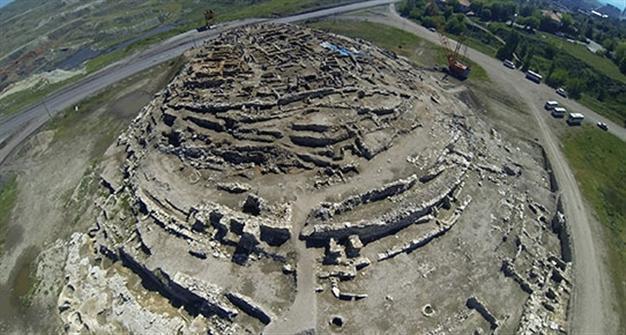Coal firm aims to halt excavations at Neolithic tumulus in western Turkey
Ömer Erbil - ISTANBUL
 A power plant company that holds the right to extract coal from a mine located under Turkey’s Neolithic Seyitömer tumulus wants to halt excavations on the site for the sake of coal.
A power plant company that holds the right to extract coal from a mine located under Turkey’s Neolithic Seyitömer tumulus wants to halt excavations on the site for the sake of coal. The Seyitömer tumulus, located in the western province of Kütahya, could be sacrificed for coal from a mine lying underneath the tumulus.
Çelikler Holding, which received the ownership rights of the coal field and thermal power plant in 2013 for $2.248 billion from the Turkish Coal Enterprises (TKİ) in a privatization, stopped funding money for the Seyitömer tumulus, forcing a halt to excavations in 2014. While the TKİ supported the excavations by being a sponsor, Çelikler Holding no longer lends support.
The Seyitömer tumulus, which is 26 kilometers from the city center, is spread over an area of 150 by 140 meters and has a height of 24 meters. The tumulus is also located on an important site for lignite.
Excavations at the tumulus started in 1989 to bring 12 million tons of brown coal to the economy.
At the same time, more than 20,000 findings have been unearthed from the tumulus so far, dating back to between the Roman period and the Bronze Age.
Professor Nejat Bilgen, who has been leading the excavations at Seyitömer since 2006 with a decree signed between the TKİ and Dumlupınar University, has beseeched the company to continue the excavations.
The site is expected to be left to the company to extract coal after the excavations are completed in a couple of years.
The Seyitömer tumulus has aroused the interest of archaeologists especially in the past few years after discoveries were made on Anatolia’s position during the Bronze Age and the political, trade and social relationship between Anatolia and Mesopotamia at the time.
One of the most important discoveries at the tumulus was the discovery of 4,000-year-old preserved brains that were boiled in their own juice in late 2013.
The finding of the brains, which date back to the Bronze Age, is unique and precious, and will not only shed light on the brain activities of ancient people but also add to the knowledge of paleontology and forensics, said Meriç Adil Altınöz, who was among the group of scientists that analyzed the discovery.
“Although they are not the oldest preserved brains found, it is still a unique and very valuable finding,” Altınöz, an academic at Haliç University’s Molecular Biology and Genetics Department, told the Hürriyet Daily News, adding that only 11 conserved brains had been listed since 1857.
















